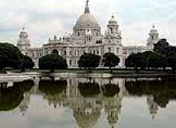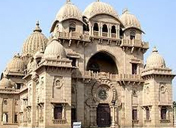INFORMATION
Customs
CUSTOMS RULES OF NSCBI AIRPORT
Customs is an authority or agency in a country responsible for collecting and safeguarding customs duties and for controlling the flow of goods including animals, personal effects and hazardous items in and out of a country.The baggage clearance at the major International Airports in India consist of two channels for clearance. Green channel:not having any dutiable goods to declare. Red channel:having dutiable goods to declare.
Remember: Non declaration & wrongful declaration of the dutiable goods may attract confiscation of goods, fine or penalty. Serious offences like attempting to smuggle Gold, without declaration may lead to arrest & prosecution. The Indian Revenue Department has specified a list of items, including the size that can now be imported duty-free as part of baggage.
Please visit the official website of Customs department, Government Of India for detailed information
http://www.cbec.gov.inCommissioner of Customs, (Admn./Airport),
Customs House
15/1 Strand Road,
Kolkata 400 001.
Phone No.033-2210-5099
Website: www.kolkatacustoms.gov.in
BAGGAGE RULES AT A GLANCE
Every passenger entering Indian has to pass through a Customs check. All incoming/arriving international passengers (both Indian and Foreign Nationals including PIO/OCI card holders) will be required to declare the content of their baggage in the Indian Customs Declaration Form prescribed in the Customs Baggage Declaration Regulations 2013 independent of the Disembarkation (Arrival) Card prescribed by the Ministry of Home Affairs, Government of India.
Thereafter the passenger takes the delivery of his/her baggage from the conveyer belts & passes through Customs. The passenger has the option of seeking clearance through the Green Channel or through the Red Channel subject to the nature of goods being carried.
GREEN AND RED CHANNELS
For the purpose of Customs clearance of arriving passengers, a two channel system has been adopted
- (i) Green Channel for passengers not having any dutiable goods.
- (ii) Red Channel for passengers having dutiable goods.
However,
- (i) All the passengers shall ensure to file correct declaration of their baggage..
- (ii) Green channel passengers must deposit the Customs portion of the disembarkation card to the Customs official at the gate before leaving the terminal.
- (iii) Declaration of foreign exchange/currency has to be made before the custom officers in the following cases :
(a) where the value of foreign currency notes exceed US $5000 or equivalent
(b) where the aggregate value of foreign exchange including currency exceeds US $ 10,000 or equivalent - Passengers walking through the Green Channel with dutiable / prohibited goods are liable to prosecution/penalty and confiscation of goods. Trafficking of Narcotics and Psychotropic substances is a serious offence and is punishable with imprisonment.
DUTY FREE ALLOWANCES AND ENTITLEMENTS FOR INDIAN RESIDENTS AND FOREIGNERS RESIDING IN INDIA
A Resident means a person holding a valid passport issued under the Passports Act,1967 and normally residing in India
I. For passengers coming from countries other than
(a) Nepal, Bhutan, Myanmar or China.
(b) Pakistan by Land Route Duty - Free Entitlements ForForPassengers For Passengers Bonafide Baggage of age 10 Years of age below 10 & above Years Used personal effects FREE* FREE* (excluding jewellery) required for satisfying daily necessities of life Other articles carried in person or in accompanied baggage
(a) if Stay abroad for Valued upto Valued upto more than three days Rs.35000/- Rs.15000/-
(b) if Stay abroad upto Valued upto Valued upto three days Rs.15000/- Rs.3000/- If returning after stay abroad of more than three days. Notification No.37/2012 dated 23.04.2012
Note:
1. The free allowance shall not be pooled with the free allowance of any other passenger.
2. The free allowance is not applicable to the following goods
1. Fire arms.
2. Cartridges of fire arms exceeding 50.
3. Cigarettes exceeding 200 or cigars exceeding 50 or tobacco exceeding 250 gms.
4. Alcoholic liquor or wines in excess of 2 litres.
5. Gold or si,lvienrany form, other than ornaments.
3. One laptop computer (notebook computer) over and above the said free allowances mentioned above is also allowed duty free if imported by any passenger of the age of 18 years and above.
4. The goods over and above the free allowances shall be chargeable to customs duty @ 35% + an education cess of 3% i.e. to say the effective rate is 36.05%.
5. Alcoholic drinks and tobacco products imported in excess of free allowance are chargeable to custom duty at the rates applicable to their commercial imports as per the Customs Tariff Act, 1962.
6. Passengers normally resident of India who are returning from a visit abroad Indian currency uptoRs. 7,500 is allowed.
7. In case the value of one item exceeds the duty free allowance, the duty shall be calculated only on the excess of free allowance.
II. For passengers coming from
(I) Nepal, Bhutan, Myanmar or China, other than by land route
(ii) Pakistan by land route Used personal effects FREE FREE (excluding jewellery) required for satisfying daily necessities of life Other articles carried in person or in accompanied baggage
Note:
1. The free allowance shall not be allowed to be pooled with the free allowance of any other passenger.
2. The free allowance is not applicable to the following goods Duty - Free Entitlements ForForPassengers For Passengers Bonafide Baggage of age 10 Years of age below 10 & above Years if Stay abroad for more than three days Rs.6000/- Rs.1500/-
(a) Fire arms.
(b) Cartridges of fire arms exceeding 50.
(c) Cigarettes exceeding 200 or cigars exceeding 50 or tobacco exceeding 250 gms.
(d) Alcoholic liquor and wines in excess of 2 litres.
(e) Gold or silver, in any form, other than ornaments.
3. One laptop computer (notebook computer) over and above the said free allowances mentioned above is also allowed duty free if imported by any passenger of the age of 18 years and above.
4. The goods over and above the free allowances shall be chargeable to customs duty @ 35% + an education cess of 3% i.e. to say the effective rate is 36.05%.
5. Alcoholic drinks and tobacco products imported in excess of free allowance are chargeable to custom duty at the rates applicable to their commercial imports.
6. Import of Indian currency is prohibited. However , in the case of passengers, who are resident of India and are returning from a visit abroad, Indian currency uptoRs. 7,500 is allowed.
7. Incase the value of one item exceeds the duty free allowance, the duty shall be calculated only on the excess of such amount.
SPECIAL ALLOWANCES FOR PROFESSIONALS RETURNING TO INDIA
An Indian passenger who was engaged in his profession abroad shall on his return to India be allowed clearance free of duty, in addition to the aforesaid allowances, articles in his bonafide baggage to the extent as mentioned below:-
(a) Indianpassenger
(i) Used household articles upto an returning after aggregate value of Rs.12000/- atleast 3 month
(ii) Professional equipment upto a value of Rs.20,000/-
(b) Indianpassenger
i) Used household articles upto an returning after atleast aggregate value of Rs.12000/- 6 month
(ii) Professional equipment upto a value of Rs.40,000/-
(c) Indian passenger
(i) Used household articles and personal returning after a stay effects, (which have been in the of minimum 365 days possession and use abroad of the during the preceding passenger or his family for at least six 2 years on termination months), and which are not mentioned in of his work, and who Annex I, Annexure II or Annexure III of the has not availed this Baggage Rules 1988 upto an aggregate concession in the value of Rs.75,000. preceding three years.
Notes: For the purposes of baggage rules Professional Equipment means:
Such portable equipments, instruments, apparatus and appliances are required in the profession in which the returning passenger was engaged. This expression includes items used by carpenters, plumbers, welders, masons and the like; This concession is not available for items of common use such as Cameras, Cassette Recorders, Dictaphones, Typewriters, Personal Computers and similar items.
DUTY FREE ALLOWANCES AND ENTITLEMENTS FOR TOURISTS DEFINITION OF TOURIST?
A tourist is a passenger
a) who is not normally a resident in India;
b) who enters India for a stay of not more than six months in the course of any twelve months period for legitimate non-immigrant purposes, such as : touring, recreation, sports, health, family reasons, study, religious pilgrimage, or business; A tourist arriving in India shall be allowed duty free clearance of articles in his bonafide baggage to the extent as mentioned below:-
a) Tourists of Indian origin
(i) used personal effects and travel coming to India other souvenirs, if - than tourists of Indian ( a) these goods are for personal use of the origin coming by land tourist, and routes as specified in (b) these goods, other than those consumed Annexure IV during the stay in India,are re-exported when the tourist leaves India for a foreign destination. (ii) articles as allowed to be cleared under rule 3 or rule 4.
(b) Tourists of foreign
(I) used personal effects origin, other than
(ii) articles other than those mentioned in those of Pakistani Annexure I upto a value of ' 8000 for origin coming from personal use of the tourist or as gifts Pakistan, coming to and travel souvenirs if these are carried India by air.on the person or in the accompanied baggage of the passenger.
(c) Tourists -
( i) used personal effects (I) of Pakistani origin (ii) articles other than those mentioned in coming from Pakistan Annexure I upto a value of ' 6000 for other than by land personal use of the tourist or as gifts routes; and travel souvenirs if these are carried
(ii) of Pakistani origin or on the person or in the accompanied foreign tourists coming baggage of the passenger." by land routes as specified in Annexure IV;
(iii) of Indian origin coming by land routes as specified in Annexure IV.
FREQUENTLY ASKED QUESTIONS (FAQs)
1. What are the Channels of Clearance?
There are two Channels for Customs Clearance:
i) Green Channel for passengers not having any dutiable goods
ii) Red Channel for passengers having dutiable goods. Passengers are advised to report at the appropriate channel for Customs Clearance.
2. Who can bring Jewellery as baggage?
An Indian passenger who has been residing abroad for over one year is allowed to bring jewellery, free of duty in his bonafide baggageupto an aggregate value of Rs. 50,000/- (in the case of a gentleman passenger) or Rs.1,00,000/- (in the case of a lady passenger).
3. What are the norms for the import of Alcoholic drinks / Cigarettes as baggage?
Following quantities of Alcoholic drinks and Tobacco products may be included for import within the duty free allowances admissible to various categories of incoming passengers :
Alcoholic liquors or Wines upto 2 litres
200 Cigarettes or 50 Cigars or 250 gms. of Tobacco. The rate of duty applicable on these products over and above the above mentioned free allowance is as under :
(i) Cigarettes BCD @100%+ educational cess @ 3%
(ii) Whisky BCD @150% + ACD @ 4% + education cess NIL.
(iii) Beer BCD @100% + ACD NIL + 3% education cess
4. Who can import gold as baggage?
Any passenger of Indian Origin or a passenger holding a valid passport, issued under the Passport Act, 1967, who is coming
Conditions
(i) The weight of silver (including ornaments) should not exceed the quantity of 10 kgs. per passenger.
(ii) Such passenger is coming to India after a period of not less than six months of stay abroad. However, short visits during these six months shall be ignored if the total duration of such short visits does not exceed 30 days and the passenger has not availed of the exemption under this scheme, at the time of such short visits.
(iii) The duty at the rate of 6% Advelorem + 3% Education Cess is paid by the passenger in convertible foreign currency. Tariff value of silver is taken as per the notifications issued from time to time.
(iv) The passenger can either bring the silver himself at the time of arrival or import the same within fifteen days of his arrival in India.
(v) The passenger can also obtain the permitted quantity of silver From Customs bonded warehouse of State Bank of India and Metal and Mineral Trading Corporation subject to conditions (i) and (iii). He is required to file a declaration in the prescribed Form before the Customs Officer at the time of arrival in India stating his intention to obtain the silver from the Customs bonded warehouse and pay the duty before clearance.
6. What are the norms for Import of Foreign Exchange / Currency?
Any person can bring into India from a place outside India foreign exchange without any limit. However, declaration of foreign exchange/currency is required to be made in the prescribed Currency Declaration Form in the following cases:-
(a) Where the value of foreign currency notes exceeds US$ 5000/- or equivalent
(b) Where the aggregate value of foreign exchange (in the form of currency notes, bank notes, traveler cheques etc.) exceeds US$ 10,000/- or its equivalent
7. What are the norms for the Import of Indian Currency? Import of Indian Currency is prohibited. However, in the case of passengers normally resident in India who are returning from a visit abroad, import of Indian Currency uptoRs. 7,500 is allowed.
8. While coming into India how much foreign exchange
can be brought in by NRIs?
An NRI coming into India from abroad can bring with him foreign exchange without any limit provided if foreign currency notes, travellers cheques, Forexplus Card exceed US$ 10,000/ - or its equivalent and/or the value of foreign currency exceeds US$ 5,000/- or its equivalent, it should be declared to the
Customs Authorities at the Airport in the Currency Declaration Form (CDF), on arrival in India.
9. What are the norms for the Import of firearms?
Import of firearms is strictly prohibited.
Import of Cartridges in excess of 50 is also prohibited.
However, in the case of persons transferring their residence (as per conditions specified in the rules) to India for a minimum period of one year, one firearm of permissible bore can be allowed to be imported subject to the conditions that:
1) the same was in possession and use abroad by the passenger for a minimum period of one year and that such firearm can be disposed off after ten years of its import. However, this facility can be availed only once.
2) the passenger has a valid arms licence from the local (Indian) authorities;
3) the customs and other duties as applicable shall be paid.
10. What are the norms for the Import of Pet Animals?
11. What are the norms for the Import of Baggage of Deceased Person?
Used, bonafide personal and household effects belonging to a deceased person are allowed to be imported free of duty subject to the condition that a Certificate from the concerned Indian mission (Embassy / High Commission) is produced at the time of clearance regarding the ownership of the goods by the deceased person.
12. What are rules & regulations for the import of Unaccompanied Baggage?
The passengers can also send their baggage through cargo which is treated as unaccompanied baggage. However, no free allowance is admissible in case of unaccompanied baggage which is chargeable to Customs duty @ 35% advalorem + 3% Education Cess and only used personal effects can be imported free of duty. Provisions of Baggage Rules are also extended to unaccompanied baggage except where they have been specifically excluded. The unaccompanied baggage should be in the possession abroad of the passenger and shall be dispatched within one Import of petsupto two numbers per passenger are allowed as baggage only to persons transferring their residence to India after two year of continuous stay abroad in terms of Baggage Rules 1998 subject to production of required health certificate from country of origin and examination of the said pets by the animal quarantine officer without an import licence issued by DGFT. month of his arrival in India or within such further period as the Deputy / Assistant Commissioner of Customs may allow. The unaccompanied baggage may land in India upto two months before the arrival of the passenger or within such period, not exceeding one year as the Deputy / Assistant Commissioner of Customs may allow, for reasons to be recorded, if he is satisfied that the passenger was prevented from arriving in India within the period of two months due to circumstances beyond his control, such as sudden illness of the passenger or a member of his family, or natural calamities or disturbed conditions or disruption of the transport or travel arrangements in the country or countries concerned on any other reasons, which necessitated a change in the travel schedule of the passenger.
13. What is Detained Baggage?
Apassenger may request the Customs to detain his baggage either for re-export at the time of his departure from India or for clearance subsequently on payment of duty.
The detained baggage would be examined and full details will beinventorised.
Such baggage are kept in the custody of the Customs.
14. What am I supposed to do in case of Mishandled Baggage?
In case the baggage has been lost or mishandled by the Airlines, a simplified procedure is in place for clearance of such baggage which allows the passenger to have delivery of his baggage at his door step by the Airlines. There is no need to handover the passport or the keys of the baggage to the airlines. The passenger has to first file a property irregularity report (PIR) with the airlines for the missing baggages. At the same time, he has to file a declaration indicating contents in the missing baggages. The passenger is required to obtain a certificate to that effect from the airlines and get it countersigned by Customs indicating specifically the unutilized portion of the free allowance. This would enable the passenger to avail the unutilized portion of the duty free allowance when his baggage is delivered by the airlines. Finally, the passenger is required to submit all these documents with the concerned airlines for clearance and delivery of goods on his behalf.
The examination of the mishandled baggage would be carried out in the presence of the passenger.
15. What are the norms for Airlines / Vessel Crew members?
Crew members are required to submit the correct declaration before Custom authorities with respect to the currency gold ornaments and electronic goods etc. in their possession on arrival as well as departure.
Crew member is allowed to bring items like chocolates, cheese, cosmetics and other petty gift items for their personal or family use upto a value of Rs.1500 only at the returning of the aircraft from foreign journey. However, a crew member on final pay off or at the termination of his engagement with the Airline shall be eligible for allowances as a common passenger.
16. Whether a passenger can import satellite phone?
Satellite phone is not permitted to be imported except against a licence to be issued by the WPC wing of Ministry of Communication and Information Technology.
OUT GOING PASSENGERS
What should you do when you leave India for abroad? All the passengers leaving India are subject to clearance by Custom Authorities. Only bonafide baggage is allowed to be cleared by passengers. There is a procedure prescribed whereby the passengers leaving India can take the export certificate for the various high value items such as camera, video camera, as well as jewellery from the Customs authorities. Such an export certificate facilitate re-importation of such goods while bringing back the things to India as no duty is charged. The advantage of having the Export Certificate is that the concessions you are entitled to, when you return, are not affected.
OTHER INFORMATION
1. Export of most species of wild life and articles made from wild flora and fauna, such as ivory, musk, reptile skins, furs, shahtoosh etc. is prohibited.
2. Trafficking of narcotic drugs and psychotropic substances is prohibited.
3. Export of goods purchased against foreign exchange brought in by foreign passengers are allowed except for prohibited goods.
4. Carrying of Indian currency notes in the denomination of Rs. 500 and Rs. 1000 to Nepal is prohibited.
5. Export of Indian Currency is strictly prohibited. However Indian residents when they go abroad are allowed to take with them Indian currency not exceeding Rs. 7,500.
6. Tourists while leaving India are allowed to take with them foreign currency not exceeding an amount brought in by them at the time of their arrival in India. As no declaration is required to be made for bringing in foreign exchange / currency not exceeding equivalent of U.S. $ 10000, generally tourists can take out of India with them at the time of their departure foreign exchange / currency not exceeding the above amount.
7. Indian residents going abroad are permitted to take with them foreign currency without any limit so long as the same has been purchased from an authorized foreign exchange dealer.
PROHIBITED AND RESTRICTED GOODS
Certain goods are prohibited (banned) or restricted (subject to certain conditions) for import and/or export. These are goods of social, health, environment, wild life and security concerns. While it is not possible to list all the goods, more common of these are :
PROHIBITED GOODS
Narcotic Drugs and Psychotropic substances.
Pornographic material
Counterfeit and pirated goods and good infringing any of the legally enforceable intellectual property rights.
Antiquities.
RESTRICTED GOODS
Firearms and ammunition.
Live birds and animals including pets.
Plants and their produce e.g. fruits, seeds.
Endangered species of plants and animals, whether live or dead.
Any goods for commercial purpose: for profit , gain or commercial usage.
Radio transmitters not approved for normal usage.
Gold and Silver, other than ornaments (For import only)
Indian and foreign currency in excess of prescribed limits:
oreign currency in excess of US$ 5, 000 in the form of currency notes or equivalent US$ 10, 000 or equivalent in the form of currency notes, bank notes or travellers cheque is required to be declared on arrival.
foreign currency in excess of amount legally obtained or in the case of tourists in excess of the amount declared on arrival or in excess of the exempted limit of declaration at the time of departure.
PENAL PROVISIONS
Please note that "non-declaration, misdeclaration and concealment of imported goods is an offence under the Customs Act which may result in confiscation, fine, penalty and even prosecution". The Indian Customs Act empowers imposition of heavy penalties for those passengers who:
attempt to walk through the Green Channel with prohibited, restricted or dutiable goods.
misdeclare their goods at the Red Channel
attempt to export prohibited or restricted goods.
abet the commission of any of the above offences. The Penal Provision may lead to:
absolute confiscation of goods, or
imposition of heavy fine in respect of the concerned goods if these are released;
imposition of penalty on individual or concerned entities
Arrest and prosecution including invocation of preventive detention in serious cases.
Annexure I
1. Fire arms.
2. Cartridges of fire arms exceeding 50.
3. Cigarettes exceeding 200 or cigars exceeding 50 or tobacco exceeding 250 gms.
4. Alcoholic liquor or wines in excess of 2 litres.
5. Gold or silver, in any form, other than ornaments.
Annexure II
1. Colour Television or Monochrome Television.
2. Digit al Video Disc Player.
3. Video Home Theatre System.
4. Dish Washer.
5. Music System.
6. Air Conditioner
7. Domestic refrigerators of capacity above 300 litres or its equivalent .
8. Deep Freezer
9. Microwave Oven.
10. Video camera or the combination of any such video camera with one or more of the following goods, namely:-
(a) Television Receiver;
(b) Sound recording or reproducing apparatus;
(c) Video reproducing apparatus.
11. Word Processing Machine.
12. Fax Machine.
13. Portable Photocopying Machine.
14. Vessel.
15. Aircraft.
16. Cinematographic films of 35 mm and above.
17. Gold or Silver, in any form, other than ornaments.
Annexure III
1. Video Cassette Recorder or Video Cassette Player or Video Television Receiver or Video Cassette Disk Player.
2. Washing Machine.
3. Electrical or Liquefied Petroleum Gas Cooking Range
4. Personal Computer( Desktop Computer)
5. Laptop Computer( Notebook Computer)
6. Domestic Refrigerators of capacity up to 300 litres or its equivalent.
Know Kolkata
-
Kolkata Hotels
Hotels Near Airport
-
Kolkata Nights
Clubs Near Airport
-
Kolkata Hotspots
Tourist Spots Near Kolkata
-
Kolkata Spirituals
Religious Spots
-
Kolkata Food
River Cruise In Ganges


